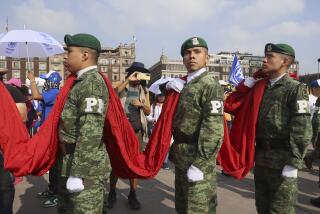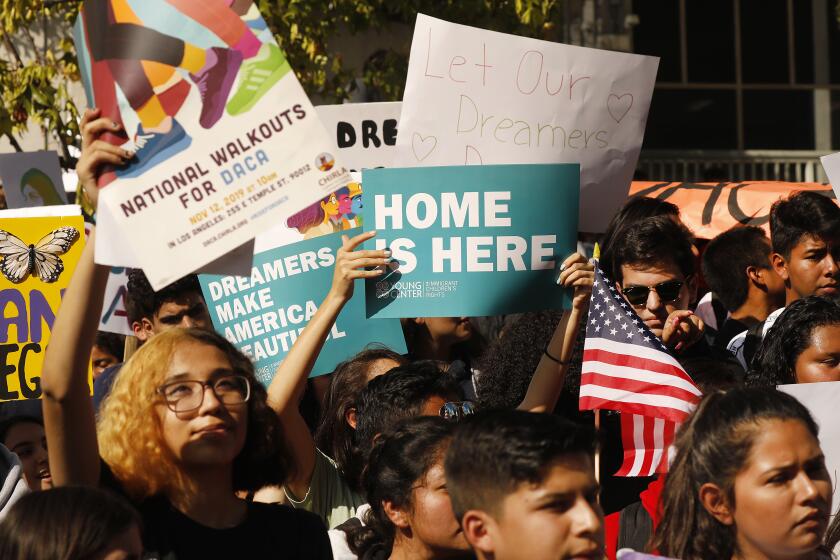Consumers Flock to Stores as Stocks Dwindle : Warsaw Uses Hard Sell to Urge Poles to Approve Reforms
While citizens rush to buy up the dwindling stocks of consumer goods in Warsaw’s shops and department stores, the Polish government has been beating the drums in an effort to get the public to purchase something else--the idea of voting Sunday in a national referendum designed to approve a set of political and economic reforms.
The national buying spree and the government’s hard sell are directly connected. While the much-promised political reforms remain vague, it is clear to every Pole that economic reform means that consumer prices--for just about everything--are about to jump sharply, and that the referendum is a mere formality on the way to much harder times.
Already, Poles are comparing the depleted department store shelves to the distressed days of late 1981, when shops were barren of goods.
“People are buying everything,” the Communist Party newspaper Polityka commented Friday. “Hot money burns hands and pockets. Lines form to buy television sets, washing machines, vacuum cleaners and furniture.”
Indeed, the lines form, outside department stores and furniture stores, as early as midnight the night before. Housewives have packed freezers full of butter. Most grocery stores are limiting purchases of sugar to two kilograms (4.4 pounds) per customer.
‘Better Than Money’
“People think that any product is better than money,” said Stanislaw Rudzki, director of the large Centrum department store in downtown Warsaw. “Even bad-quality products are better than bad money.”
The government, meanwhile, has embarked on an unprecedented advertising campaign, on radio and television and in newspapers, to promote Sunday’s referendum, the first such vote here in 41 years.
One television spot depicts a weight-lifter struggling to hoist a heavy barbell. As the athlete, clad in Poland’s national colors of red and white, finally succeeds, the word reform is superimposed on the barbells.
Painful Sacrifice
The idea of a national struggle--and painful sacrifice--are at the heart of the government’s reform plan.
The referendum poses two questions. One asks voters to approve economic reforms, “knowing it means living through a difficult period of rapid change.” The second, far more rhetorical in nature, asks approval for a “Polish model of deep democratization.”
It is hard for most observers here to detect enthusiasm for either of the two questions. A poll taken by the government’s official polling agency suggests that 60% of the eligible voters will go to the polls, with 17% refusing to take part and 23% undecided on whether to vote or not. Of those definitely voting, the agency said, 86% said they would approve of the economic question and 93% would vote for the “democratization” question.
Few Poles have any doubt that the government will get the result that it wants out of the referendum. It is doubtful that the majority will exceed 65%, particularly on the first question, which is the issue that most immediately concerns the public.
New Times
“These are not the old Stalinist times,” a ranking party theoretician said in an interview Friday. “No one accepts a vote of 99%. If we have a vote of 55%, 65%, we will be happy.”
It is clear that the referendum is an attempt by the government of Gen. Wojciech Jaruzelski to build credibility with a deeply suspicious Polish public, which has been promised reform often in the past, only to see the pledges whittled away. Jaruzelski’s own 1982 reform plan--now referred to as “the first stage”--came to nothing.
But it is not yet certain how the government will build enough credit with the public to make acceptable the price increases that it envisions for early next year.
A paper presented last week to a plenary meeting of the Communist Party’s Central Committee called for a major revision of the nomenklatura system, which now works to install and favor party figures--often unqualified--in key jobs throughout business, industry and government. A change in the nomenklatura system, regarded by party liberals as a crippling burden on the economy and the government, would be a significant change, but experts doubt that such a shift could be carried out quickly.
Ludwik Krasucki, an editor of Nowe Drogi, who helped to draft the working paper presented to the party meeting, said the Communist Party of Poland is now undergoing a process of “learning and understanding” about changes that are “definitely coming.”
“You must understand,” he said, “that in the party are people who have been indoctrinated for 20 and 30 years. They have been to party schools, they have read the books, they have listened to the speeches. We must now work to make the party understand that we have come to a time for some very deep changes.”
Although debate within the party is inevitable, he said, the party leadership, under Jaruzelski, will not be deflected.
“These will be big and deep reforms,” Krasucki said, “and they will be made 100%. You can liquidate your thinking that there will be a retreat--not on a single point.”
The Central Committee is expected to approve the political proposals, already accepted by the Politburo, which are supposed to strengthen local governments, drop some requirements for party-approved candidates to local offices and, it is hoped, draw more young people into the party ranks.
Still, these changes are not likely to make an immediate impression on a cynical public, whose attention in the coming months is more likely to be focused on the struggle to pay about twice as much as they are accustomed to paying for items such as meat and gasoline.
The government hopes the evidence provided by Sunday’s referendum will help to defuse any protest that might blow up over the price hikes. It seems as likely, however, that the public’s lasting memory of referendum week in Poland will be the pre-dawn lines in front of the department store.
More to Read
Start your day right
Sign up for Essential California for news, features and recommendations from the L.A. Times and beyond in your inbox six days a week.
You may occasionally receive promotional content from the Los Angeles Times.






